- Interview CEO
- Vetropack Locations
- Market environment offering opportunities and challenges
- Business model
- Strategy 2030
- Management Structure
- Organisation
- col2
- Material Topics and Performance Review
- Customers and suppliers
- Finances
- Innovation and intellectual property
- Production and products
- Employees
- Environment
- col3
- New Design
- Financial Report
- col1
- At a Glance
- Financial Report Vetropack Group
- Consolidated Balance Sheet
- Consolidated Income Statement
- Consolidated Cash Flow Statement
- Changes in Consolidated Shareholders’ Equity
- Consolidation Principles
- Valuation Principles
- Notes
- Ownership Structure
- Company Participations
- Report of the statutory auditor on the consolidated financial statements
- Five Year Overview
- col2
- Financial Report Vetropack Holding Ltd
- Balance Sheet
- Income Statement
- Notes
- Board of Directors’ (BoD) Proposal for the Corporate Profit Appropriation
- Report of the statutory auditor on the financial statements
- Five Year Overview
- Corporate Governance
- col1
- Introduction
- Board of Directors
- MB Members
- Remuneration and Additional Information
- Shareholders’ Participation Rights
- Auditors
- Information Policy
- General blocking periods
- Contact Address
- Remuneration Report
- col1
- Introduction
- Principles of the Remuneration Scheme and its Components
- Organisation and Authorities for Determining Remuneration
- Description of the Remuneration Components
- Board of Director’s Remuneration
- Management Board’s Remuneration
- Comparison of Remuneration disbursed with the Remuneration approved by the 2021 and 2022 Annual General Assembly
- Shareholdings
- Report of the statutory auditor on the remuneration report
- Sustainability Report
- col1
- Sustainability Report
- Customers and suppliers
- Finances
- Innovation and intellectual property
- Production and products
- Employees
- Environment
- col2
Foundations for success
New Design
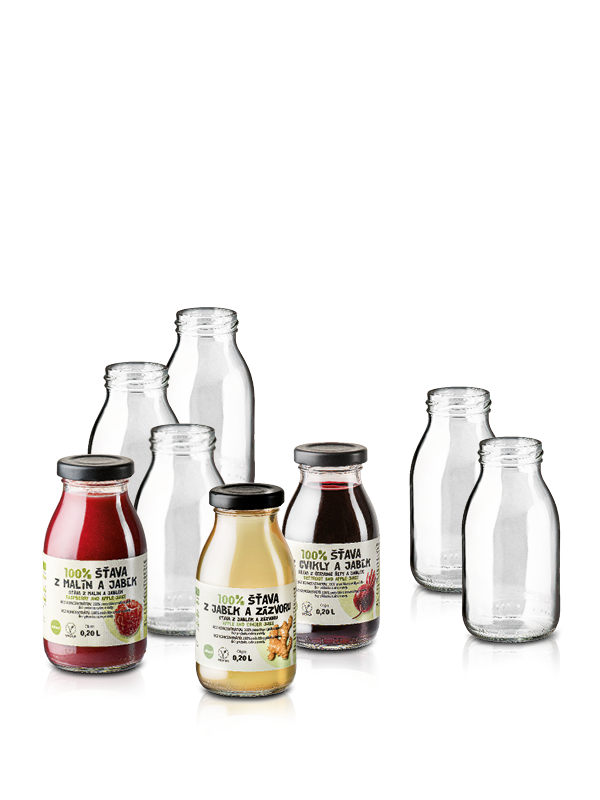

Chic
Where health meets style
Zdravo Organic gets the best out of nature for its juices. And they want you to see it. The gentle curves of the white 200 ml bottles by Vetropack Straža create a sophisticated look.
Health consciousness has grown enormously in recent years, a phenomenon reflected in the success of food and drinks producers who focus on making natural products. One of these is Zdravo Organic. With Zdravo meaning “healthy”, it does exactly what it says on the glass. Based in Selenca in Vojvodina, the company only uses the highest-quality local fruit and vegetables for its juices, conserves, pickles and ajvar sauce, avoiding the use of additives and preservatives. The best packing medium for products like this is glass, which is why Zdravo Organic only uses glass bottles for its juices.
The centrepiece of the family of bottles we make for Zdravo Organic is the new 200 ml juice bottle with twist-off cap. It is just as chic and compact as its older, larger siblings, the 314 ml jar and 750 ml bottle, but its gentle curves give it a particularly sophisticated look. Bon voyage, beautiful bottle – Zdravo products are loved around the world and can be found as far afield as Canada and China.
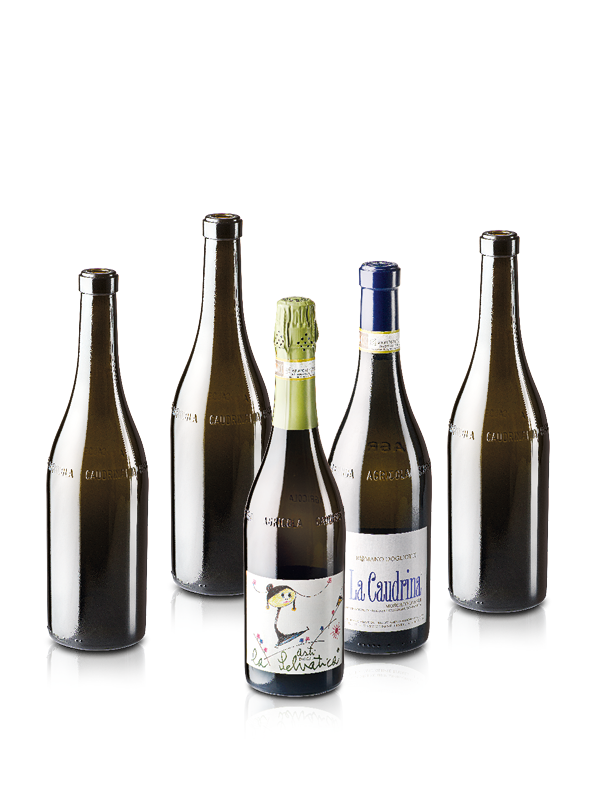

Pleasure of life
Balanced
Azienda Agricola Caudrina brings the liquid sun of Piedmont to wine connoisseurs. Winemaker Romano Dogliotti places great value on having aesthetically pleasing packaging for his fine wines – which is why he is working with Vetropack Italia.
The fertile, sunny Piedmont region has always been known as an outstanding terroir for Muscat grapes. Here, near Asti, is where Romano Dogliotti works. The owner of Azienda Agricola Caudrina is almost obsessed with creating the most sumptuous wines possible. The shining stars of his collection are the Moscato d’Asti La Caudrina and Asti Spumante La Selvatica DOCG. These sweet yet gently acidic sparkling wines, which pair perfectly with tapas and light summer dishes, are an ode to the pleasure of life.
It has been almost 20 years since Vetropack Italia’s Milan glass works produces the 750 ml custom bottles for Azienda Agricola Caudrina. The cuvée coloured bottle is perfectly elegant, featuring balanced proportions and a decorative relief. But it also has another subtle level. Each part of the design comes together to form a beautiful frame for the attractive label, designed by the artists Alessandro Lupano and Romano Levi.
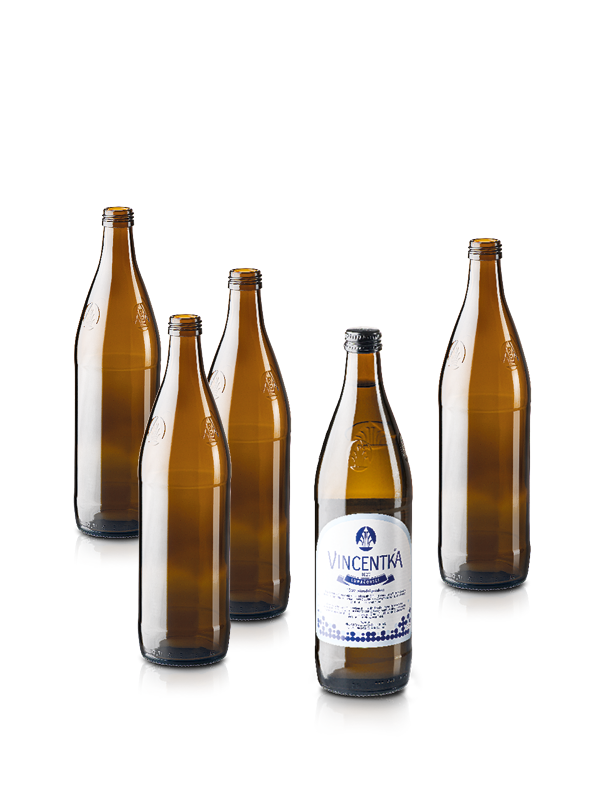

Natural
A match made in heaven
Bis vor 200 Jahren wurde das Heilwasser Vincentka in Keramikgefässe abgefüllt, seither wird es in Glasflaschen ausgeliefert. Zum Jubiläum hat sich Vincentka eine besondere Flasche in limitierter Auflage geschenkt.
To say Vincentka is a mineral water is an understatement. The premium product is actually a medicinal healing water. It comes from Luhacovice, the largest and oldest spa town in Moravia, whose ten natural healing springs draw visitorsfrom all over the world. The water is suitable for drinking and inhalation therapies for a variety of illnesses, but healthconscious people also enjoy its many benefits day-to-day.
Apart from a brief interlude, Vincentka has been bottled in glass since 1820. The relationship between this special water and glass is therefore now 200 years old. Vincentka is celebrating this anniversary by working with Vetropack Moravia Glass to produce an anniversary edition bottle that is considerably darker and greener than its traditional counterpart. Some 400,000 of the anniversary bottles have been manufactured to celebrate this natural pairing. Because just like the healing water, glass too is synonymous with health and high quality.
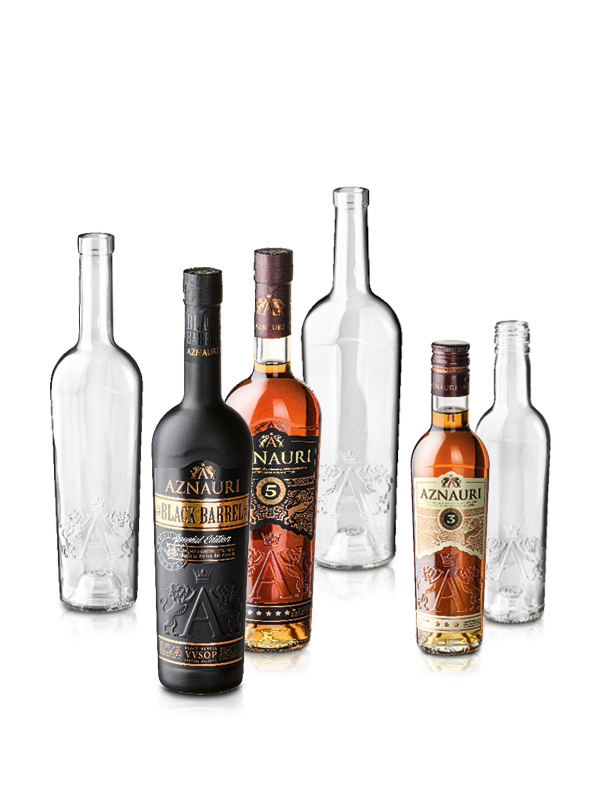

Majestic
Liquid gold
With its glass packaging for Aznauri brandy, Vetropack Gostomel is proving just how much a bottle can reflect the image of a brand and a sophisticated tipple.
The name Aznauri comes from the ancient honorary title, which was awarded for special merits. Equally illustrious and exalted is the brandy of the same name, distilled bythe Ukrainian company Global Beverage. In keeping with the world of nobility, the brand’s image is dominated by majestic lions. A unique drink like this needs a very special bottle, just like the one made by Vetropack Gostomel.
To show off the dark gold, shimmering colour of the brandy, the 0.25-, 0.5- and 0.7-litre bottles are made from thick, colourless glass. The combination of the curves and convex engraving on the front is stunningly harmonious. Two grand lions holding a crown above the letter A reflect the nature of the drink: strong and proud, yet unique and self-sufficient. No question, this bottle really does boost the enjoyment of genuine connoisseurs.
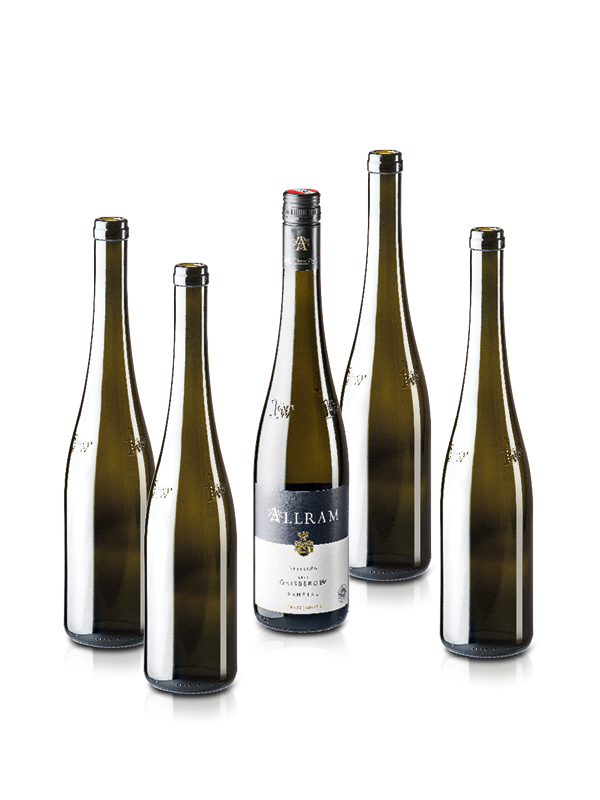

Elegant
The best of the best
The wineries that form the “Österreichische Traditionsweingüter” association have developed a special classification. The highly customised bottles for the “Erste Lage” wines are produced by Vetropack Austria.
Austria’s winegrowing regions are incredibly diverse. The varying soil compositions and microclimates mean that even neighbouring vineyards can produce very different wines. Members of the “Österreichische Traditionsweingüter” association have put a great deal of passion and expert knowledge into determining how tiny details about a vineyard can influence the quality and identity of its wine.
The association has developed a classification system that distinguishes between “Klassifizierte Lage” (similar to appellation controlée), “Erste Lage” (similar to Premier Cru) and “Grosse erste Lage” (similar to Grand Cru). Vetropack Austria has developed Rhine wine bottles for the “Erste Lage” group that immediately reflect the special quality of these wines. The “Erste Lage” logo is made in glass relief, like a hallmark, while the shoulder area of the bottle is an elegant cuvée colour. The wineries can then choose between a swisstype thread or cork finish – because with wines, it’s always “to each their own”.
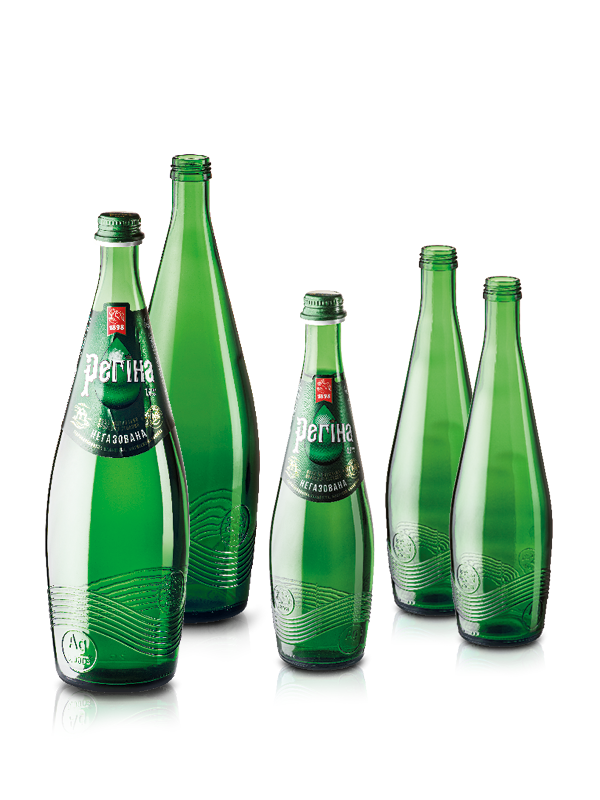

Noble
Get the best
As the legend goes, spring water from the subterranean lake in Podolia in Ukraine once healed the sick daughter of a Polish nobleman. Her name, Regina, became the brand name of the mineral water sourced from that lake. Vetropack Gostomel is adding extra value to this highquality spring water with a new glass bottle.
Regina – this still, natural product is the queen of Ukrainian table water. Up until 1917 and the fall of the European aristocracy, Regina was delivered to the tabletops of the emperors and exported abroad to Austria-Hungary, Romania, Germany, Poland and France. Even though its well-to-do consumers have since disappeared, the water has maintained its noble properties and helps to maintain a perfect, general bodily tone now as much as ever.
Now Regina is available in 1-litre and 0.5-litre bottles made of green glass, a unique and distinctive vessel. On the base of the bottle is a wave-shaped engraving, a curved logo akin to the chemical symbol for silver. This is not a coincidence – the mineralrich water not only contains trace elements of sodium, calcium and magnesium, but also silver. The precious metal has antiviral properties and strengthens the immune system. It is not only for aesthetic reasons that the bottle is made from glass – this choice of material guarantees that the health-giving water preserves its qualities even when stored for long periods of time.
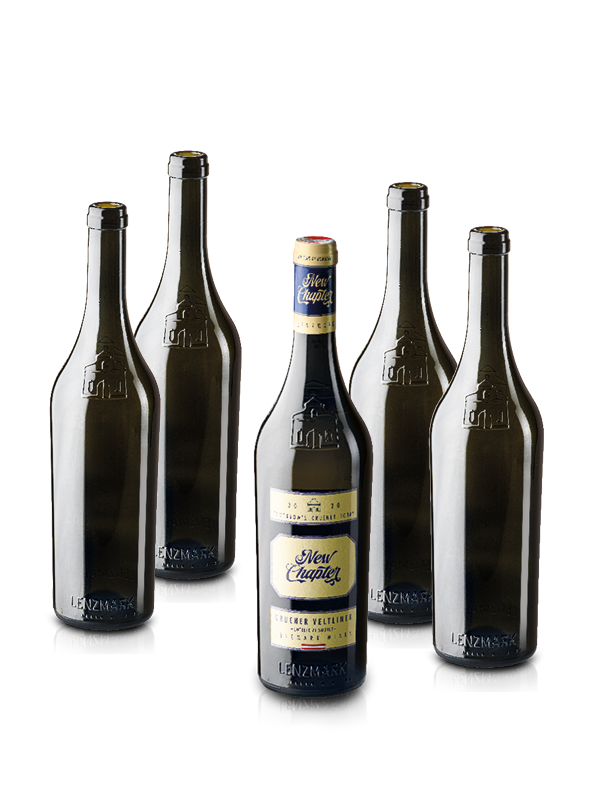

Trailblazer
A new chapter
Austrian star winemakers Markus Huber and Lenz Moser have taken on the challenge of writing a trailblazing new chapter in the history of Austrian wine. Vetropack Austria helped the two give their exciting project a unique look with a brand new bottle design.
The Grüner Veltliner grape variety is the pride of Austria’s wine country, predominantly sold and enjoyed in Germanspeaking regions. Lenz Moser and Markus Huber, two Veltliner specialists of the Austrian wine industry, believe that this hidden gem of a grape is ready to earn a broad international fanbase and achieve global cult status. Under the brand Lenzmark – New Chapter, the two winemakers have combined their wealth of experience with the aim of reinterpreting the taste of Grüner Veltliner and developing a modern style – Veltliner 2.0, so to speak – targeted at both experienced connoisseurs and young, demanding target groups.
It was therefore vital for the product to feature an unusual bottle design. The intricate look of the conical 0.75-litre cuvee-coloured wine bottle gives the team everything they wanted. A complex glass relief at the shoulder, the Lenzmark brand name engraved at the base, and a three-part paper label on the front embody the new style of this very special wine.
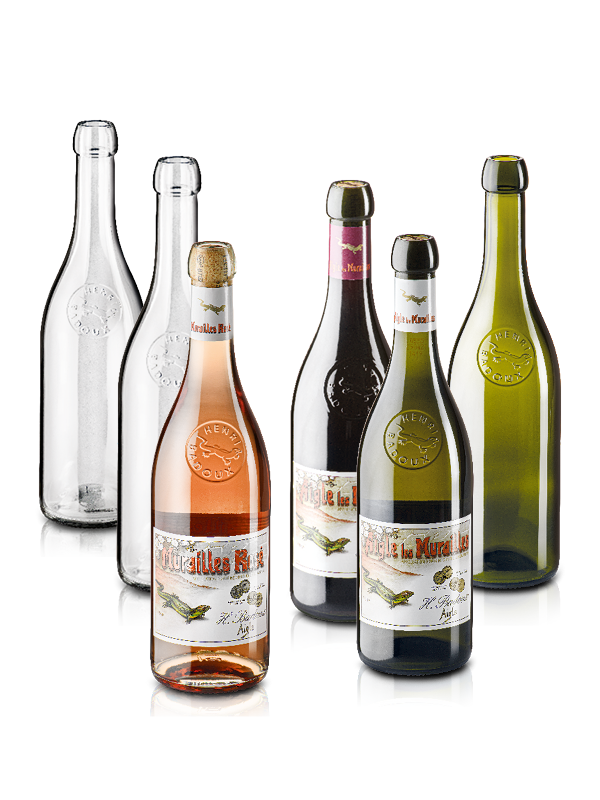

Prestigious
Passing down traditions
The Henri Badoux vineyard has given its emblematic lizard an elegant update. The new olive-coloured edition of the bottle is produced by the Vetropack glass works in St-Prex and the white glass version by Vetropack Austria.
Henri Badoux founded the vineyard that shares his name in 1908. Since then, the family enterprise has grown continually. Today, it encompasses 55 hectares of vineyards and makes wine with the produce from one hundred hectares. The name Henri Badoux is inseparable from the lizard that has adorned the labels of his wine bottles for over a century.
In 2021, the vineyard underwent a rebranding campaign. White and red wine are now hitting the shelves in an olive-coloured 0.7-litre bottle, while rosé is bottled in white glass. The iconic lizard is accentuated in a sober and elegant style on the bottles in the new wine collection – a link between tradition and the modern world. The emblem is also an important element of the Chablais ecosystem, a factor that is additionally reflected in the low weight of the bottles. Due to its high cork finish, the upper part of the cork is clearly visible and, of course, is also adorned with a lizard.
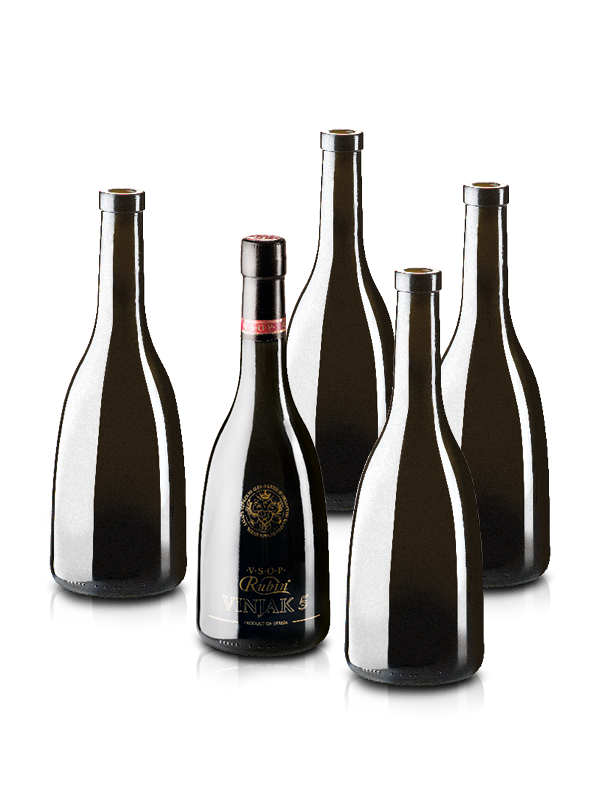

Grandeur
Beauty and indulgence
Straightforward elegance – you can apply this description to the Vinjak 5 V.S.O.P. made by the central Serbian winery Rubin as well as to its packaging. The striking black bottles are produced by Vetropack Straža.
The winery Rubin, with its 10,000 hectares of vines across 19 locations, is the largest Serbian producer of wines and spirits. The winery is renowned for its top-class wines, highly valued throughout the Balkans and beyond, but also for its exquisite brandy. Vinjak 5 V.S.O.P. has contributed a great deal to the good reputation of Rubin’s spirits. It is made from carefully selected distilled wines and aged for at least five years in a 500-litre oak barrel. The light-dark contrasts of its amber colour along with its reddish shimmer and highly complex aroma with notes of vanilla, plum, coffee and spices make it the king of Serbian brandies.
Only the best packaging could suffice for such a sublime product – the elegant, dark, heavy bottles made by Vetropack Straža. They are a no-frills affair. At the end of the day, Vinjak 5 V.S.O.P. is about unadorned indulgence. This way, the eye is drawn to the single piece of decoration – the 700 ml cuvee bottle is finished off with a gold-coloured screen print before it is filled.
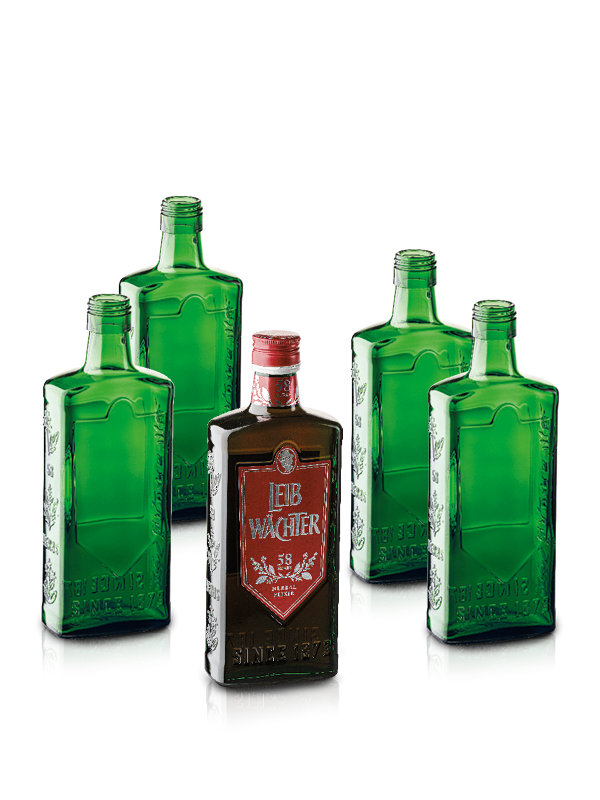

Memorable
A new look
Vetropack Austria has created a new bottle for the Austrian Schlumberger Group’s traditional Leibwächter bitter spirit, with a design that memorably showcases what makes the liqueur truly unique.
The coachman was always a trusted companion and guardian of his passengers. He would wait outside in the rain and wind with his horses while enjoying a well-earned occasional sip of Leibwächter, a liqueur made from a variety of different herbs. The bittersweet herbal spirit is still popular today, enjoyed either as an invigorating aperitif or mixed with orange juice, bitter lemon or cola to create a refreshing cocktail.
The tradition of the elixir, with its delicate sweetness that brings out the glorious herbal notes to particularly good effect, now has a striking bottle to match, thanks to the new design of the 0.5-litre green glass bottle created at the Austrian Vetropack glassworks in Pöchlarn. The rectangular bottle’s sides are richly decorated with glass reliefs of some of the 58 herbs inside. The year the drink was first created, 1873, is also engraved at the base of the bottle. The high-quality printed label nestles safely in the specially created depressions in the surface.
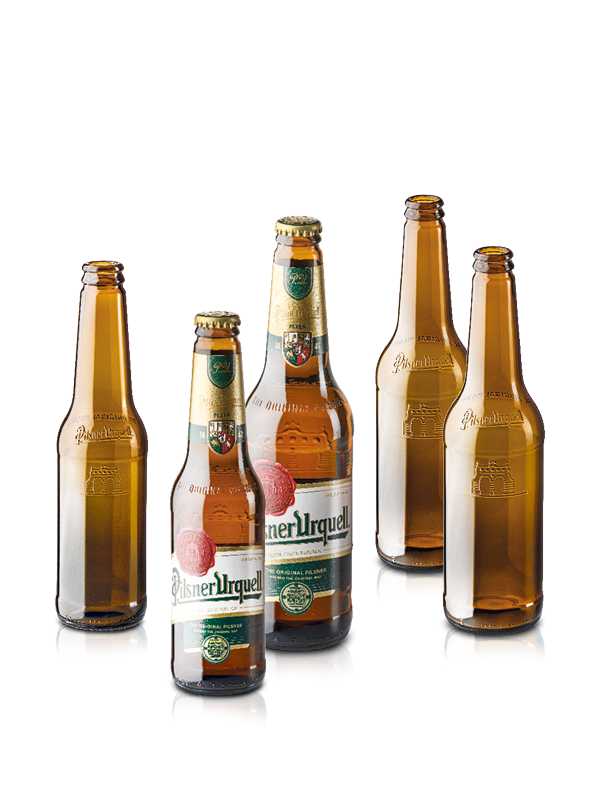

Boundless
Tradition and sustainability
The traditional Czech brand Pilsner Urquell is launching a new returnable bottle, thereby strengthening its commitment to sustainability. The elegant bottle with striking embossing is produced by Vetropack Moravia Glass.
Glass is equally suitable for one-way and returnable bottles. A returnable bottle can be reused more than 40 times. In light of the debate surrounding the environmental impact of packaging, the demand for returnable glass bottles is growing. Vetropack strives to produce its packaging as ecologically as possible. For example, the use of recycled glass and returnable containers is being systematically increased in order to conserve natural resources as much as possible.
No empty promises
The Plzenský Prazdroj brewery is taking another important step towards sustainability: the new returnable bottle for the world-famous Pilsen beer with its striking embossing does away with the aluminium foil at the neck of the bottle, while the plastic labels are replaced by recyclable paper ones. The message to beer lovers is clear: “With the new bottles, you are helping to protect the environment.” This change will mean that around 106 tonnes of waste can be saved per year. These are the facts.
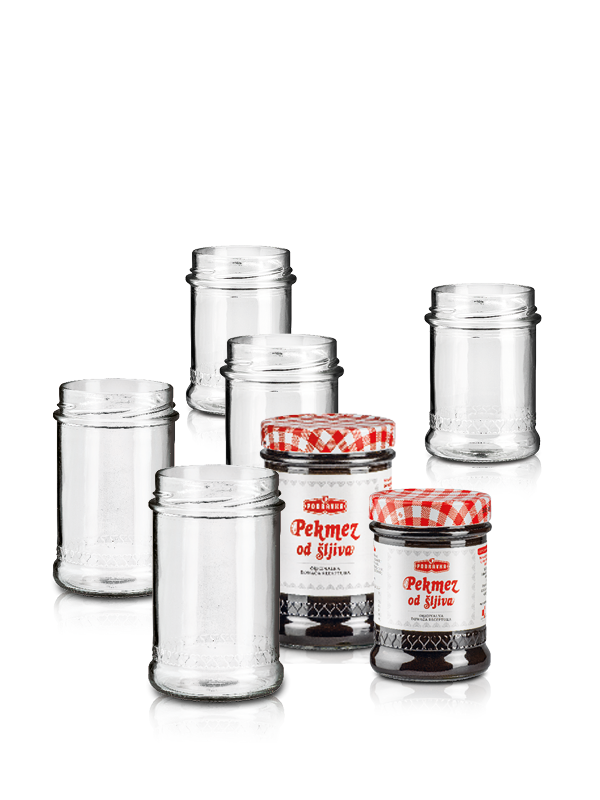

Just like home-made
A product with heart
Fruit spreads from Podravka, a well-known Croatian food producer, come with a great tradition. The company’s roots date back to 1934, and it has been making fruit jams since 1947. As well as high quality, the Podravka brand is now a byword for “home-made” — a trait that is both modern and natural.
Recently, the company revamped its brand image in tandem with the renowned Milan design agency Smith Lumen. And as fruit and fruit spreads have always been close to Podravka’s heart, a heart symbol has been chosen as the centrepiece of the new packaging design. Because nothing says “emotion” more than a heart! Now, a glass heart-shaped relief surrounds the labels of the new wide-necked jars used for the fruit spreads.
This challenging but effective heart-shaped relief was transferred to the packaging by the glass specialists at Vetropack Straža. The white glass jars, with their deep twist-off caps, are developed exclusively for Podravka in two different sizes in 314 ml and 580 ml sizes. They are produced at the Vetropack plant in Croatia.
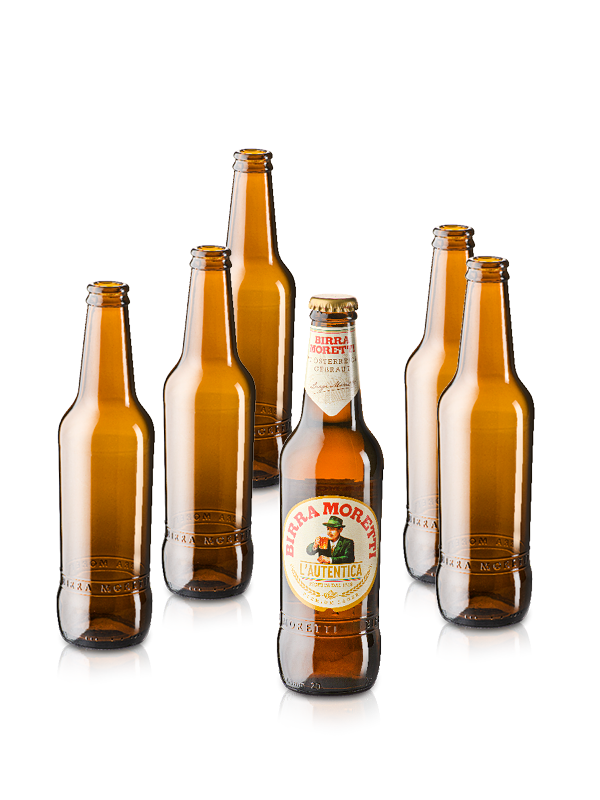

Authentic
Italian zest for life
Heineken is bringing some Italian zest for life to the German market with “Birra Moretti”. The new 0.33-litre returnable bottles for this beer come from the Vetropack glass works in Kremsmünster, Austria.
Birra Moretti was first brewed over a century ago by Luigi Moretti, in his “beer and ice cream factory” in the Italian city of Udine. Today, Birra Moretti is among the most famous beers in Italy and its production process has remained almost unchanged.
“A sip of joie de vivre” – that’s Heineken’s invitation to German beer fans to give this authentic Italian beer a try. This refreshing drink is brewed in the Wieselburg brewery in Austria under Italian supervision and bottled in brown 0.33-litre returnable bottles with a crown cork mouth for the German market. Our mission in designing this bottle was to roll tradition and authenticity into one. This has been achieved by putting the “Birra Moretti” logo in glass relief on the base combined with the striking label.
- Sustainability Report
- col1
- col1
- col1
- col1
- Material Topics and Performance Review